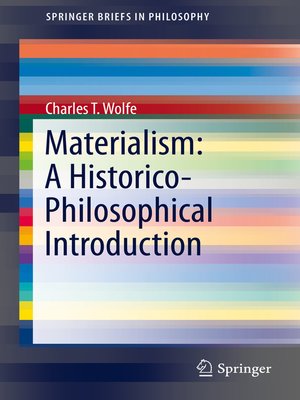Materialism
ebook ∣ A Historico-Philosophical Introduction · SpringerBriefs in Philosophy
By Charles T. Wolfe

Sign up to save your library
With an OverDrive account, you can save your favorite libraries for at-a-glance information about availability. Find out more about OverDrive accounts.
Find this title in Libby, the library reading app by OverDrive.



Search for a digital library with this title
Title found at these libraries:
| Library Name | Distance |
|---|---|
| Loading... |
This book provides an overview of key features of (philosophical) materialism, in historical perspective. It is, thus, a study in the history and philosophy of materialism, with a particular focus on the early modern and Enlightenment periods, leading into the 19th and 20th centuries. For it was in the 18th century that the word was first used by a philosopher (La Mettrie) to refer to himself. Prior to that, 'materialism' was a pejorative term, used for wicked thinkers, as a near-synonym to 'atheist', 'Spinozist' or the delightful 'Hobbist'. The book provides the different forms of materialism, particularly distinguished into claims about the material nature of the world and about the material nature of the mind, and then focus on materialist approaches to body and embodiment, selfhood, ethics, laws of nature, reductionism and determinism, and overall, its relationship to science. For materialism is often understood as a kind of philosophical facilitator of the sciences, and the authorwant to suggest that is not always the case. Materialism takes on different forms and guises in different historical, ideological and scientific contexts as well, and the author wants to do justice to that diversity. Figures discussed include Lucretius, Hobbes, Gassendi, Spinoza, Toland, Collins, La Mettrie, Diderot, d'Holbach and Priestley; Büchner, Bergson, J.J.C. Smart and D.M. Armstrong.







